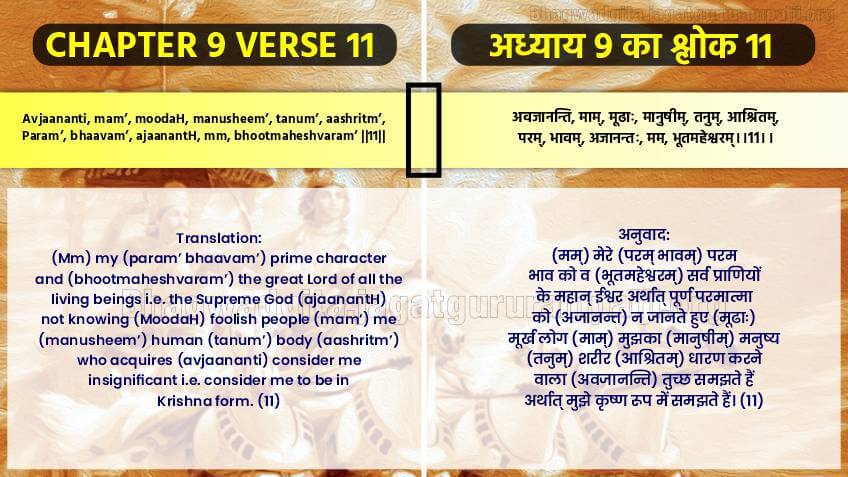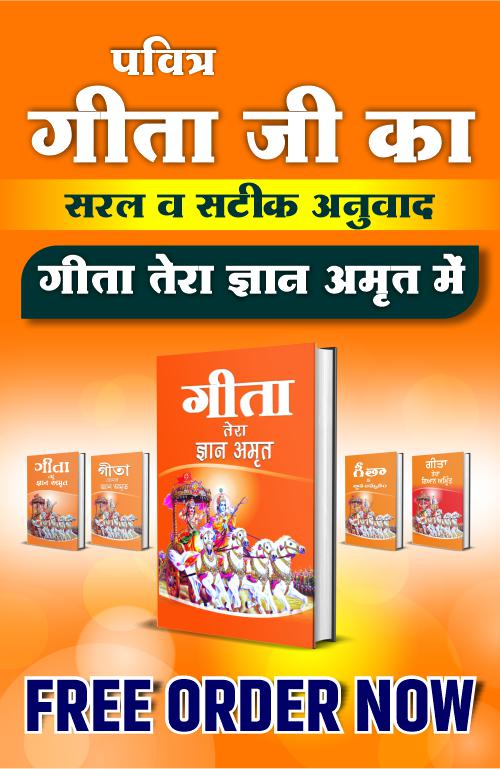
Avjaananti, mam’, moodaH, manusheem’, tanum’, aashritm’,
Param’, bhaavam’, ajaanantH, mm, bhootmaheshvaram’ ||11||
Translation: (Mm) my (param’ bhaavam’) prime character and (bhootmaheshvaram’) the great Lord of all the living beings i.e. the Supreme God (ajaanantH) not knowing (MoodaH) foolish people (mam’) me (manusheem’) human (tanum’) body (aashritm’) who acquires (avjaananti) consider me insignificant i.e. consider me to be in Krishna form. (11)
Translation
Not knowing my prime character and the great Lord of all the living beings i.e. the Supreme God, foolish people consider me as insignificant who acquires a human body i.e. consider me to be in Krishna form.
Meaning
Because of lack of Tatvgyan foolish people regard me as the lord of all the living beings. I am not Maheshwar (the Greatest Lord); the Supreme God is Maheshwar. This is mentioned in Gita Adhyay 15 Shlok 4 and 16, 17; in Gita Adhyay 18 Shlok 3, 8, 9, 10. And are considering me as Shri Krishna who acquires a body in incarnation form; I am not Shri Krishna. Its evidence – in Gita Adhyay 7 Shlok 24-25 and Gita Adhyay 8 Shlok 20 to 22, both (Brahm and Purna Brahm) have been described as unmanifested and there is detailed description. The description of above-mentioned fools is also given in the following shloks that they do not even listen when told, and because of their stubbornness keep regarding me as Sarveshwar (Lord of all) – Maheshwar (the Greatest lord) and Shri Krishna. If some Tatvdarshi Saint guides them that the Supreme God is someone else and Shri Krishna Ji has not narrated Gita Ji and this (Kaal) is not Maheshwar, then these fools do not accept it.
Important: - The translation of Gita Adhyay 9 Shlok 11 has been done by other translators. In that they have joined the second word “mam’ ” of the first line with “bhoot maheshwarm’ ” of the second line, which from the point of view of grammer is unjustified because with “bhoot maheshwarm’ ” the word “mm’ ” is written. The other translators have written the Giver of the knowledge of Gita as the Great Lord of all the living beings. If we consider it like this, then the readers may please understand its meaning as this, that Brahm is saying that I am the Great Lord i.e. Chief of all the living beings in my twenty-one brahmands. In reality, the above-mentioned translation which has been done by me, Das (servant), is accurate.
अवजानन्ति, माम्, मूढाः, मानुषीम्, तनुम्, आश्रितम्,
परम्, भावम्, अजानन्तः, मम, भूतमहेश्वरम्।।11।।
अनुवाद: (मम्) मेरे (परम् भावम्) परम भाव को व (भूतमहेश्वरम्) सर्व प्राणियों के महान् ईश्वर अर्थात् पूर्ण परमात्मा को (अजानन्त) न जानते हुए (मूढाः) मूर्ख लोग (माम्) मुझका (मानुषीम्) मनुष्य (तनुम्) शरीर (आश्रितम्) धारण करने वाला (अवजानन्ति) तुच्छ समझते हैं अर्थात् मुझे कृष्ण रूप में समझते हैं। (11)
भावार्थ:- तत्वज्ञान के अभाव से मूर्ख प्राणी मुझे सर्व प्राणियों का प्रभु मानते हैं। मैं महेश्वर नहीं हूँ, महेश्वर तो पूर्ण परमात्मा है। जो गीता अध्याय 15 श्लोक 4 व 16, 17, गीता अध्याय 18 श्लोक 3,8,9,10 में वर्णन है तथा मुझे शरीर धारण करने वाला अवतार रूप में श्री कृृष्ण समझ रहा है, मैं श्री कृृष्ण नहीं हूँ। इसी का प्रमाण गीता अध्याय 7 श्लोक 24-25 में तथा गीता अध्याय 8 श्लोक 20 से 22 में दोनों (ब्रह्म तथा पूर्ण ब्रह्म) को अव्यक्त बताया है तथा विस्तृृत वर्णन है।
उपरोक्त मूर्खों का विवरण निम्न श्लोक में भी दिया है कि वे कहने से भी नहीं मानते, अपनी जिद्द के कारण मुझे सर्वेश्वर-महेश्वर व श्री कृृष्ण ही मानते रहते हैं। यदि कोई तत्वदर्शी संत समझाएगा की पूर्ण परमात्मा कोई और है तथा श्री कृृष्ण जी ने गीता जी नहीं बोला तथा यह (काल) महेश्वर नहीं है। वे मूर्ख नहीं मानते।
विशेष:-- गीता 9 श्लोक 11 का अनुवाद अन्य अनुवाद कर्ता ने किया है उस में प्रथम पंक्ति के दूसरे अक्षर ‘‘माम्’’ को द्वितिय पंक्ति के ‘‘भूत महेश्वरम्’’ से जोड़ा हो जो व्याकरण दृष्टिकोण से न्याय संगत नहीं है क्योंकि ‘‘भूत महेश्वरम्’’ के साथ ‘‘मम्’’ शब्द लिखा है अन्य अनुवाद कर्ताओं ने गीता ज्ञान दाता को सम्पूर्ण प्राणियों का महान् ईश्वर किया है। यदि एैसा ही माना जाए तो पाठक जन कृृप्या इसका भावार्थ यह जाने की ब्रह्म कह रहा है कि मैं अपने इक्कीस ब्रह्मण्डों के सर्व प्राणियों का महान ईश्वर अर्थात् प्रमुख हूँ। वास्तव में उपरोक्त अनुवाद जो मुझ दास द्वारा किया है। वह यथार्थ है।
